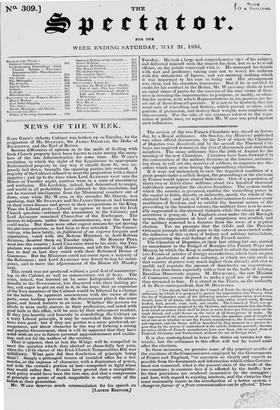NEWS OF THE WEEK.
EARL GREY'S ricketty Cabinet was broken up on Tuesday, by the resignation of Mr. STANLEY, Sir JAMES GRAHAM, the Duke of RICHMOND, and the Earl of RIPON. Serious differences of opinion as to the mode of dealing with Irish Church property have been known to exist among the mem- bers of the late Administration for some time. Mr. WARD'S resolution, in which the right of the Legislature to appropriate Ecclesiastical property in any way it should deem fit, was ex- pressly laid down, brought the opposing parties into contact. A majority of the Cabinet refused to meet the proposition with a direct negative ; and up to the time when Lord ALTHORP went into the House on Tuesday night, matters were in a state of uncertainty and confusion. His Lordship, indeed, had determined to resign, and would in all probability have adhered to this resolution, had not he received intelligence from the Ministerial conclave out of doors, even while Mr. WARD, or his seconder Mr. GROTE, was speaking, that Mr. STANLEY and Sir JAMES GRAHAM had hurried on their court dresses and given in their resignations to the King. Thus the Liberal party—Liberal in opinion at least on the Irish Church question—retained the ascendancy in the Cabinet; and Lord ALTHORP remained Chancellor of the Exchequer. The motion to adjourn, under these circumstances, was the best he could make. But there were other cogent reasons for not moving the previous question, as had been at first intended. The Conser- vatives, who have lately, in fulfilment of an elpress bargain and etipulation, voted with the Reform Ministers in Anti-Reform divisions, deserted them on Tuesday night. Sir ROBERT PEEL went into the country ; Lord CHANDOS went to his club; the Tory phalanx was scattered in all directions, and left the Whig Minis- ters to deal as best they could with their Reformed House of Commons. But the Ministers could not count upon a majority of the Reformers ; and Lord ALTHORP was forced to beg for indul- gence, and to move the adjournment of the House till Monday next.
This result was not produced without a good deal of manceuver- ing in the Cabinet, as well as remonstrance out of doors. The crisis, indeed, was hurried on by some Independent Members, friendly to the Government, but disgusted with their halting po- licy', and eager to put an end to it, in.the hope that an expulsion of the Tory members of the Cabinet would be followed by a change for the better. In apparent concurrence with the views of this party, some leading persons in the Government played the same game, and forced matters to an issue. Whether the persons we allude to were really sincere in their professions, and acted with good faith in this affair, will be seen by their subsequent conduct. If they join heartily and honestly in remodelling the Cabinet on a truly Liberal principle, it may be concluded that their inten- tions were good : but if they are parties to a mere patchwork ar- rangement, and throw obstacles in the way of forming a strong and, popular Government, then it will be apparent that they have atited.Avitli..an eye to future personal aggrandizement and exalta- tion, and .notfor the welfare of the country. Thus it'aimears, that at last the Whigs will be compelled to meet the question which they shirked so shamefully last year, when the 147th clause of the Irish Church Temporalities Bill was witlidhisirii.- What gain did that dereliction of principle bring them? Simply a prolonged tenure of troubled office for a few months, at the expense of character, with a diminution of power, and with the coward's portion at last-7-compelled to fight when they would rather flee. Events have .proved that a straightfor-, Ward policy would have been the true.ohe, and that a compromise of principle on points of such magnitude is worthy only of the foolish in their generation.
Mr. WARD deserves much commendation for his speech on
Tuesday. He took a large and comprehensive ie s of his subject, and delivered himself with the utmost freddom, but so as to avoid offence, on the points connected with it. He managed his details with tact and prudence; taking care not to weary his auditors with dry statements of figures, and yet omitting nothing which it was important to his case to bring out His arrangement was clear, and his elocution impressive. But if he is entitled to credit for his conduct in the House, Mr. WAR') may claim at least an equal share of praise for the exercise of the rare virtue of firm- ness in resisting the importunities to postpone, or modify, or aban- don his motion, with which Representatives in his position are be- set out of doors from all quarters. It is not to be doubted, that the usual arts of wheedling and flattery, which prevail so often with patriots af pretension, and destroy their weight, were employed on this occasion. For the sake of our common interest in the repu- sation of public men, we rejoice that Mr. WARD was proof against . such influences.




















